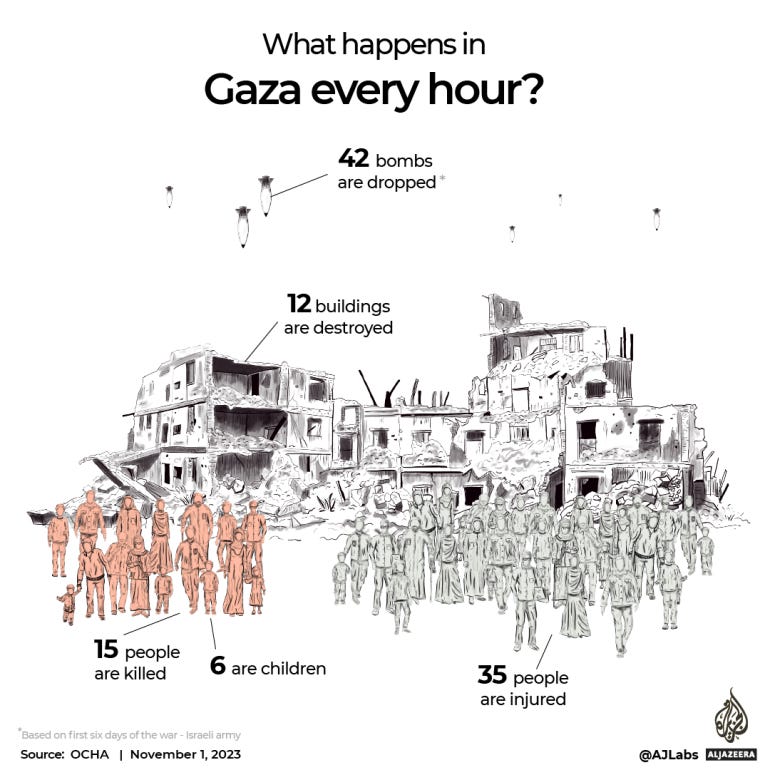Whatever Happened to an Eye for an Eye?
Israel's barbaric assault on Gaza flouts the Law of Talion, and a lot more besides.
The rule of “an eye for an eye and a tooth for a tooth” is best known to us from the Torah, where it occurs with minor variations three times, in Exodus, Leviticus and Deuteronomy. Here is Leviticus 24: 19-21 (King James Version): “And if a man cause a blemish in his neighbour; as he hath done, so shall it be done to him; Breach for breach, eye for eye, tooth for tooth: as he hath caused a blemish in a man, so shall it be done to him again. And he that killeth a beast, he shall restore it: and he that killeth a man, he shall be put to death.”
It is a remarkable thing how “an eye for an eye” has acquired over time a meaning which is quite at variance with its original significance, or is even exactly opposed to it. What the phrase generally conjures up for us now is an idea of unbridled vengeance, a bloodthirsty free-for-all, and a readiness to take matters, if need be, down to the “last man standing”. Yet even the brief passage quoted above ought to indicate that this is not at all the original sense. On the contrary, what is being enjoined upon the Israelites here is a principle of strict reciprocity; yes, it is permitted and even required that the aggrieved party should be able to “even the score”, but nothing beyond that.
In this respect the Mosaic law can be seen as one expression of a broader legal principle current in the ancient Middle East and extending into early modern times, which was the law of exact retaliation (Latin: lex talionis, or Law of Talion). According to this principle, a person who has injured another person is to be penalized to a similar degree by the injured party or his relatives. An early expression of the principle is to be found in the Code of Hammurabi (1755-1750 BCE), promulgated several centuries before the likely formulation of the Mosaic Law.
The intent of such decrees, harsh though they may seem to us, was to forestall the feuds and vendettas between conflicting parties or their respective families and clans which were otherwise liable to carry on indefinitely, tearing apart the fabric of tribal society as they did so. It was in this context that the God of the Old Testament itemised and specified concrete penalties to match concrete offences, given a prevailing mentality which was mainly lacking in any more abstract sense of justice. And in any case it gradually became the custom - already explicitly permitted by the Bible in certain cases - to replace physical punishment with monetary redress. This represented the beginnings of an abstract understanding, with the punishment no longer tied to the specific nature of the offence, but expressed also through what we would now call financial compensation.
A significant proportion of the Israeli population today continues to profess fidelity to the law of Moses. It would seem reasonable then to ask how that law would find expression in the conflict between Israel and the Palestinians, and more specifically in the war on Gaza following the Hamas attacks of last 7 October. Over the interminable months since then, have Israeli actions been observant of “an eye for an eye” in the proper sense, as in the Law of Talion, or have they been the expression rather of unbridled vengeance wreaked on a largely helpless population?
The question only needs to be posed correctly to provide its own answer.
Five and a half months into the Israeli invasion of Gaza, paralleled by the unleashing of settler and IDF violence on the Palestinians in the West Bank, there have been roughly ten times more Palestinians killed than Israelis. For that matter, we don’t know as yet how many Israelis were killed on 7 October by Hamas and how many by the IDF, as the latter implemented its so-called Hannibal Directive. But in any case we find a flagrantly disproportionate number of casualties comparing the two sides, and yet even so, the Netanyahu government seems intent on continuing the slaughter, along with the punitive destruction of Gaza’s basic infrastructure.
And no doubt the killing is continuing even as I write these words, and as you, dear reader, are reading them.
Israel seems intent on putting out a lot of Palestinian eyes, not least the eyes of those whose job it is to bear witness to the barbarism being inflicted on Gaza.
Turning from this atrocious spectacle back to its distant religious background, we find that the Mosaic standard, appropriate for its epoch, was superseded for Christians by the Sermon on the Mount. “Ye have heard that it hath been said, An eye for an eye, and a tooth for a tooth: But I say unto you, That ye resist not evil: but whosoever shall smite thee on thy right cheek, turn to him the other also.”
Well, over the last 2000 years that’s not generally been the Christian attitude when smitten on one cheek, is it? Failure to live up to the moral standards set by one’s religion is clearly not just an issue for Jews. In fairness though, Christ sets the bar a good deal higher than Moses, although there are already numerous instances in the Old Testament which anticipate an encompassing vision for humanity as a whole.
For one such example we need go no further than the quote from Leviticus in my opening paragraph, which continues in the following verse: “Ye shall have one manner of law, as well for the stranger, as for one of your own country: for I am the Lord your God.” One manner of law for the Palestinian as for the Israeli: how far we remain from that ideal in the present day! Where the state of Israel is concerned there is only one manner not of law but of lawlessness, flouting as it does every kind of moral standard, be it ancient or modern. Current international law and respect for universal human rights get treated in the same dismissive way as the Mosaic law of three thousand years ago. All are set aside in favour of the one modus operandi which alone is recognised, the law of lawlessness, which is: Might is Right.









The Jews were special in that they were the vehicle for the introduction of the idea of universalism, evident especially in Isaiah but peeping out at various points of the OT. The paradox is that once that universalism took hold, the special role of the Jews became redundant. An example perhaps of what Hegel called the cunning of history.
An illuminating read, Louis; I hadn't thought about the disproportionate Israeli reaction to Oct 7th in these very obvious biblical terms! An eye for an eye, indeed - or in Netanyahu's reading: a whole geographical region for a pop concert venue.
Throughout this conflict (massacre) I've been amazed at the moral gibberish of previously intelligent social commentators, Douglas Murray, Jordan Peterson, etc, who profess to see nothing wrong with Israel effectively destroying a whole region and its people in retaliation for 7/10. The only conclusion I can draw is that prejudice is an infinitely powerful force capable of blinding anyone to the truth at any given time.
Like many of us (I suspect), I hold no banner for Islam. Whatever wisdom it may possess when applied at a personal level, I dislike Islam as an organised religion - and I have even less time for its immigrant proponents telling us what to do in our own (European) countries. Nevertheless it is still clear to me that the Palestinians are being butchered by the state of Israel, which has been given the 'all-clear' by the West to do what it likes, when it likes. Indeed, even to protest against Israel is to find oneself beyond the moral pale - such is Jewish influence on the West's current worldview. In this context the payback for The Holocaust seems unlimited.
Such, it seems to me, are history's infinitely long cycles: we are stuck in them and though we may be on the right side of history they grind good and evil to dust all the same. Our tragedy is strange indeed.
What is tragically clear is that the West is now so comprehensively bankrupt in any meaningful moral sense that our career towards involvement in a greater conflict now seems inevitable.